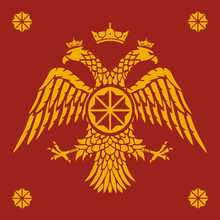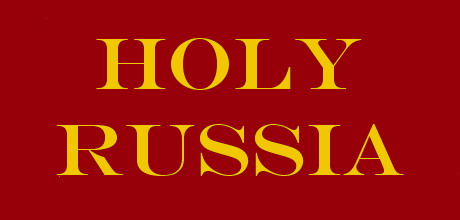THE AGREEMENT OF CONFEDERATION
OF HOLY RUSSIA – THIRD ROME Confederations, federations, the States, the territorial, administrative and private subjects who have signed the present Agreement, proceeding from own sovereignty and the right of the nations on self-determination; Supporting the Declaration of the State sovereignty and the Constitution of Holy Russia – Third Rome; Recognizing domination of the Supreme Authority of Grand Prince of All Russia – Emperor of Holy Russia and Third Rome; Taking into account the general history, culture, religion and affinity of historical destinies of peoples, royal houses and private subjects; Confirming continuity of the right Holy Russia – Third Rome to the States: Russian Empire, Russ Empire, Polish–Lithuanian Commonwealth, Great Princedom Lithuanian, Crimean Khanate, Golden Horde, Genghis Khan Empire, Great Princedom of the Moscow, Great Princedom of the Vladimir, Great Princedom of the Yaroslavl, Novgorod Russia and the Kiev Russia, Khazars Khanate, Russian Khanate and Great Bulgaria, and also Holy Roman Empire, New Rome, Ancient Rome and Bosporus Empires. Have decided to create on the new beginnings Confederation Holy Russia – Third Rome and have agreed as follows. I. MAIN PRINCIPLES The First. The States and each subject of Confederation – participants of the Agreement are sovereign subjects. Holy Russia – Third Rome is the confederative monarchic State which is carrying out the Supreme authority within the limits of powers with which it is allocated voluntary with participants of the Agreement. The Second. The States and the subjects forming Confederation, reserve the right on the independent decision of all questions of the development, guaranteeing equal political rights and opportunities of social and economic and cultural progress to all peoples and the ethnos living in their territory. The Third. The State religion of Confederation is the Christianity. The Fourth. The States and the subjects forming Confederation, count the major principle priority of human rights according to the General declaration of human rights, other conventional norms of international law. State languages of Confederation are Russian, English and German languages. To all citizens the opportunity of studying and use of the native language, a unimpeded access to the information, a freedom of worship, other political, social and economic, personal rights and freedom is guaranteed. The Fifth. The States and the subjects forming Confederation, independently define the national – State and administrative-territorial device, system of authorities and managements. The Sixth. Monetary unit of Confederation is Solidus, the coin of pure gold in weight of 10 grams. All currencies of subjects of Confederation have in the basis a part of cost Solidus, determined laws of the market. The Seventh. The confederation Holy Russia – Third Rome acts in the international attitudes as the sovereign State, the subject of international law. The States and the subjects forming Confederation, are subjects of international law. They have the right to establish direct diplomatic, consular communications, trading and other attitudes with the foreign States, to exchange with them the plenipotentiary representations, to conclude the international Agreements and to participate in activity of the international organizations, not infringing interests of each of the States and the subjects forming Confederation, and their general interests, not breaking the international obligations of Confederation. II. THE DEVICE OF CONFEDERATION Clause 1. The Supreme authority in Confederation. Sovereign to Emperor of Holy Russia – Third Rome possesses the Supreme Authority in the Confederation, given by the God and limited to the Constitution of Holy Russia for the good of people. Clause 2. Membership in Confederation. Membership of the States and the subjects forming Confederation is voluntary. Participants of the present Agreement are the States and the subjects directly forming Confederation. The confederation is open for the introduction into it of any States and the subjects recognizing the Agreement of Confederation. Acceptance in Confederation of the new States and subjects is carried out with the consent of Grand Prince of All Russia – Emperor of Holy Russia and Third Rome. The States and the subjects forming Confederation, keep the right of a free output from it in the order established by participants of the Agreement. Clause 3. Citizenship of Confederation. Citizens of the States and the subjects who are included in Confederation, are simultaneously citizens of Holy Russia – Third Rome. Citizens of Confederation have rights, freedom and the duties fixed by the Constitution and the international Agreements of Confederation. Clause 4. Territory of Confederation. The territory of Confederation will consist of territories of all States and subjects – participants of the Agreement. The confederation guarantees indestructibility of borders of the States and subjects which enter into it. Clause 5. Attitudes between the States and the subjects forming Confederation. Attitudes between the States and the subjects forming Confederation are adjusted by the present Agreement, and also other Agreements not contradicting to it and agreements. The States and subjects – participants of the Agreement build the mutual relations in structure of Confederation on the basis of equality, respect of the sovereignty, non-interference to internal affairs, resolutions of disputes peace means, cooperation, mutual aid, and diligent performance of obligations under the present Agreement. The States and the subjects forming Confederation undertake: to not resort in attitudes among themselves to force and threat by force; to not encroach on territorial integrity each other; to not conclude the agreements contradicting to the purposes of Confederation or directed against other States and subjects - participants of the Agreement. Clause 6. Armed forces of Confederation. Holy Russia – Third Rome has uniform Armed forces under supervision of Grand Prince of All Russia – Emperor of Holy Russia and the Third Rome. The States and subjects – participants of the Agreement have the right to have and create own armed formations. Clause 7. Sphere of joint conducting the States and subjects – participants of the Agreement and multilateral agreements. The States and subjects – participants of the Agreement form uniform political and economic space and found the attitudes on fixed in the Constitution and the Agreement of Confederation principles. Attitudes with the States and the subjects, who are not included in Confederation, are based on the conventional norms of international law. With view of maintenance of the general interests of the States and subjects – participants of the Agreement spheres of joint conducting are established and corresponding multilateral Agreements and agreements consist: — About economic cooperation;
— About joint defense and collective safety;
— About coordination of the general scientific and technical programs;
— About protection of human rights and national minorities;
— About coordination of the general ecological programs;
— About cooperation in the field of power, transport, communication and space;
— About cooperation in the field of formation and culture;
— About struggle against criminality. Clause 8. Powers of Confederative bodies. For realization of the general problems following from the Agreement and multilateral agreements, the State and the subjects forming Confederation, adhere to positions of the Constitution of Holy Russia – Third Rome. Each participant of the Agreement can by the conclusion of the agreement with Confederation in addition delegate to it realization of separate powers, and Confederation, to transfer one or to several of them realization to their territories of separate powers. Clause 9. The property of Confederation. The States and subjects – participants of the Agreement provide free development and protection of all patterns of ownership. The States and subjects – participants of the Agreement transfer the property necessary for realization of powers assigned to them at disposal of bodies of Confederation. This property is the joint confederative property, and is used exclusively in their general interests. Use of the ground, its bowels and other natural resources of the States and subjects – participants of the Agreement for realization of powers of confederative bodies is carried out according to the legislation of these States and subjects. Clause 10. The budget of Confederation. The order of financing of the confederative budget and the control his account part is established by the special agreement. Clause 11. Laws of Confederation. Legislative basis of Confederation are the present Agreement and the Constitution of Holy Russia – Third Rome. Laws of Confederation are accepted on the questions attributed to conducting of Confederation, and within the limits of the powers transferred to it by the present Agreement. They are obligatory for execution in territory of all States and subjects – participants of the Agreement. The States or subjects – participants of the Agreement have the right to protest and suspend in the territory the law of Confederation if it breaks the present Agreement. The confederation on behalf of Emperor of Holy Russia – Third Rome has the right to protest and suspend the law of the State or the subject – the participant of the Agreement if it breaks the present Agreement. III. BODIES OF CONFEDERATION Clause 12. Sovereign Emperor. Sovereign Emperor of Holy Russia – Third Rome possesses the Supreme Authority given by the God and limited to the Constitution of Holy Russia for the good of people. Clause 13. Formation of bodies of Confederation. The bodies of Confederation stipulated by the present Agreement are formed on the basis of the Constitution of Holy Russia – Third Rome, will of peoples and full representation of the States and the subjects forming Confederation. Clause 14. The State Duma. The legislature of Confederation is carried out by Sovereign Emperor together with the State Duma consisting of two chambers is the Boyar and National Duma. The Boyar Duma is appointed Sovereign Emperor and the National Duma is selected national voting. Sovereign Emperor possesses the right of the legislative initiative and the right of the veto in all subjects of the legislation. Sovereign Emperor asserts the laws accepted by the Duma, and without His Statement no law can have the fulfillment. Clause 15. The Government of Confederation. Sovereign Emperor carries out executive authority in unification with the Government of Holy Russia. The executive authority belongs to the Council of Ministers of Holy Russia supervised by Chairman of the government which is put forward by the State Duma, is selected national voting and affirms Sovereign Emperor. The control of executive authority over all his volume belongs to Sovereign Emperor within the limits of all State of Holy Russia – Third Rome. Clause 16. The Supreme Court of Confederation. The judicial authority is independent and is carried out on behalf of Sovereign Emperor by the Courts established by the law which decisions are executed by the Name of Imperial Majesty. The maximum Court is the Supreme Court of Confederation. The order of formation of the Supreme Court of Confederation is defined by the law.
IV. FINAL PROVISIONS Clause 17. Capital of Confederation. Capital of the State is New Rome. Clause 18. The State symbolic of Confederation. The confederation has the State is Coat of arms, flag and hymn. Clause 19. The order of change and addition of the Agreement. The present Agreement or his separate positions can be cancelled, changed or added only with the consent of all States and the subjects forming Confederation. Clause 20. The introduction of the Agreement valid. The present Agreement is approved by Sovereign Emperor and the supreme bodies of the government of the States and the subjects forming Confederation, and inures after his signing by their proxy delegations and Sovereign Emperor. Clause 21. The responsibility under the Agreement. Confederation, the States and subjects, its forming, bear the mutual responsibility for performance of the accepted obligations and indemnify, caused by infringements of the present Agreement.
Grand Prince of All Russia Valeriy Viktorovich Kubarev Grand Kubensky Moscow, Holy Russia September 21, 2013
| 











